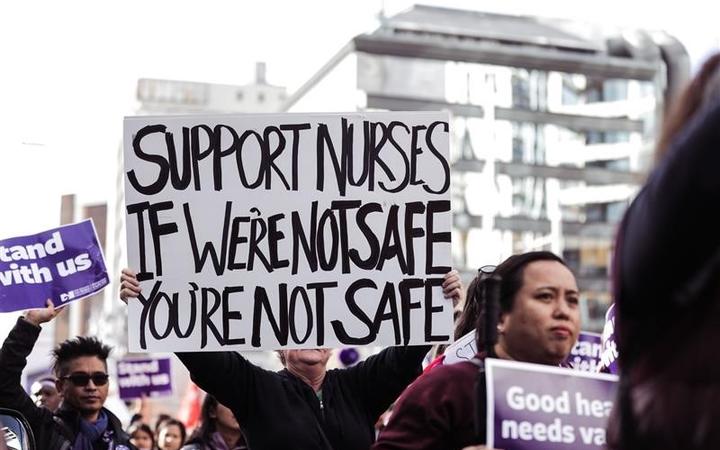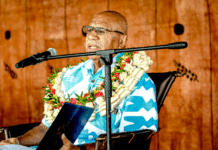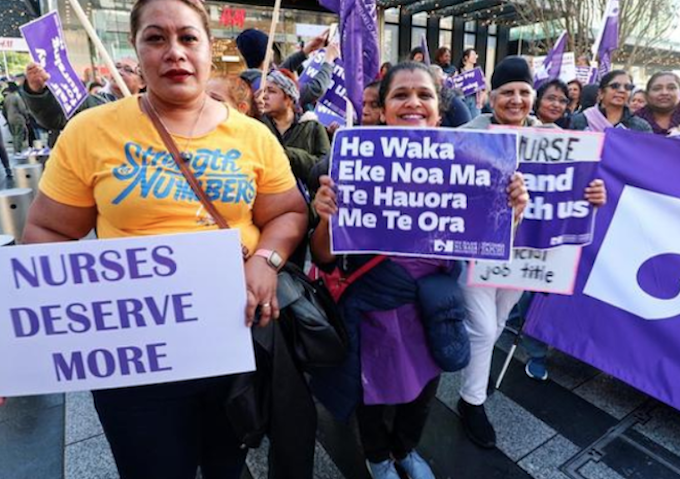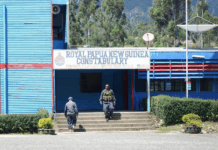New Zealand’s nurses and midwives’ union and district health boards (DHBs) will discuss where to from here after failed pay negotiations led to an eight-hour national strike yesterday.
Thousands took to the streets, including nurses and supporters, to protest for better pay and conditions.
The DHBs and New Zealand Nurses Organisation (NZNO) was today discussing a possible further date for negotiations, and listen to feedback from union members.
- LISTEN TO RNZ FIRST UP: ‘There are some financial constraints’ – Deputy Prime Minister Grant Robertson (duration 7:32
- ‘It was about raising awareness’ – NZNO industrial services manager Glenda Alexander (duration 3:53
- ‘We think we’ve been able to address many of their requirements’ – Spokesperson for all DHBs Jim Green (duration 4:22
Deputy Prime Minister Grant Robertson said the government was totally committed to getting back to the negotiating table, represented by the DHBs.
“Obviously there are some financial constraints in the wake of covid but we do understand the importance of this workforce and we want to negotiate in good faith,” Robertson told RNZ First Up.
The pay settlement in 2018 “made a big difference” but the unfortunate reality was that higher pay rates were available in Australia and had been for some time.
“Nursing is a global environment, but we still think the salaries that are offered are competitive along with other working conditions and clearly, obviously, living here in New Zealand,” Robertson said.
“That doesn’t stop us from knowing we’ve got to sit down and have a good negotiation and do that in good faith.”
Improving conditions just as important as pay – NZNO
NZNO industrial services manager Glenda Alexander told RNZ Morning Report conditions and pay needed to improve so essential workers did not look to other sectors for a better salary.
“They’re kind of interwoven [pay and conditions]. If we don’t pay people what they’re worth, what the job is worth, they’re not going to stay and we’re not going to get new people into the nursing workforce.”
Nurses and midwives were exhausted and there was a need to attract more people to replace an ageing workforce that was set to retire, Alexander said.
“If we can’t improve conditions whereby new nurses come into the system, we’re in serious trouble.
“Nurses do their very best at work to not reveal to patients that they’re caring for what’s really going on but patients see some of that stuff – they see the nurses running from person to person, they note they haven’t had breaks.”
The union wanted systems that were agreed to in the last bargaining period put into place, including ensuring the right people were on shifts and boosting capacity to respond to demand.
“We want to see that put well in place … so that our members have surety that when they come to work they are going to have workloads that are manageable,” Alexander said.

Canterbury DHB clinical nurse specialist Nikki Reid, who is also a union member, said there was a huge amount of public support yesterday with people even signing a petition to Minister of Health Andrew Little.
“The fact we had so many nurses out on the picket line is indicative of the depth of feeling for nursing that we have to get this correct because at the end of the day this is also about, or hugely about, patient safety,” Reid said.
“I would say it is incumbent on the DHBs and the government to produce a better offer so that we can recruit and retain nurses and have a nursing workforce that is safely staffed to ensure best outcomes for those patients.”
Manukau Surgery Centre associate clinical nurse manager Audrey Hauraki, a union delegate, agreed, saying the strike was not just about pay.
“I don’t think our members want to focus entirely on the wages that we’re after — for all those nurses that turned up yesterday, they took a day off without pay because that’s how passionately they feel.”
It was “heart-breaking” to hear stories about nurses turning up to work and finding they were short-staffed, Hauraki said.
“And then to get to the end of the shift and not be able to leave because there aren’t enough nurses coming on to take over from you.
“Everyday our nurses turn up to places like ED where they are assaulted, physically and emotionally abused and it’s just not on.”
DHBs keen to ‘close gaps’
Spokesperson for all the DHBs, Jim Green, said had been making progress with continuous improved offers, but welfare and staffing levels were of still concern to the workers.
“We’ve made offers around all those areas — we’ve made a pay rise increase of up to 8 to 12 percent and of course there’s the pay equity settlement that will be coming in on top of that as well,” he told Morning Report.
“We think we’ve been able to address many of their requirements and we’re looking to see where some of the gaps can be closed by the nurses and the [union] members.
Further negotiations were needed to see how the problems could be resolved, Green said.
Nearly all non-urgent surgery and outpatient clinics had to be postponed yesterday as a result of the strike.
“That will take time to work back into the schedule [the elective surgeries], we’re of course doing a lot of work to catch up after the time lost last year around Covid, so it’ll add to the work we have to do,” Green said.
It was difficult for services to operate during the strike but they had managed, he said.
“It’s always difficult to manage during a strike and it really took all of the efforts of all of the people who weren’t striking — the volunteers, family members, and of course the life-preserving services provided by the union — to get us through that time.
This article is republished under a community partnership agreement with RNZ.














































